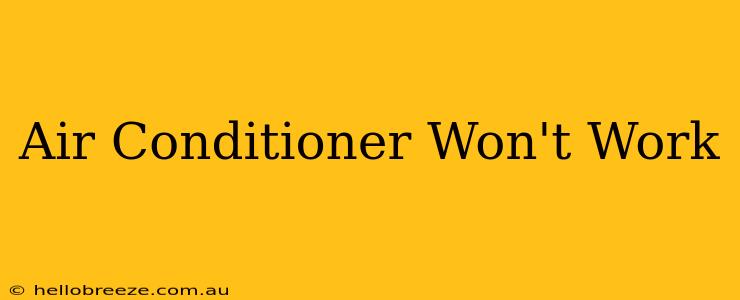Is your air conditioner refusing to cooperate on a hot day? A malfunctioning AC unit can be incredibly frustrating, leaving you sweltering and uncomfortable. Before you panic and call a repair technician (which can be expensive!), let's troubleshoot some common issues you can tackle yourself. This guide will walk you through the most frequent problems and potential solutions, helping you get your AC working again in no time.
Common Reasons Why Your Air Conditioner Isn't Working
Several factors can cause your air conditioner to fail. Let's dive into some of the most prevalent:
1. Power Issues:
- Check the Circuit Breaker: This is the most common culprit! An overloaded circuit or a tripped breaker can cut power to your AC unit. Locate your breaker box and check if the breaker controlling your AC is in the "off" position. If it is, simply switch it back "on." If it immediately trips again, you might have a more serious electrical problem requiring professional help.
- Power Cord and Outlets: Inspect the power cord for any visible damage like fraying or cracks. Ensure the outlet is functioning correctly by plugging in another appliance to test it.
2. Thermostat Troubles:
- Check the Thermostat Settings: Sounds obvious, but double-check that your thermostat is set to "cool" and the temperature is set lower than the current room temperature.
- Battery Issues (for some models): If you have a digital thermostat that runs on batteries, weak or dead batteries can prevent it from functioning properly. Replace them with fresh batteries.
- Thermostat Calibration: Sometimes, the thermostat might need recalibration. Consult your thermostat's manual for instructions on how to do this.
3. Filter Problems:
- Dirty Air Filter: A clogged air filter restricts airflow, reducing cooling efficiency and potentially causing the unit to shut down. Locate your air filter (usually found behind a panel on the unit itself or near the return air vents). If it's dirty or dusty, replace it with a clean one. This is often the easiest fix!
4. Refrigerant Leaks:
- Low Refrigerant Levels: This is a more serious issue requiring professional help. If your AC isn't blowing cold air, and the other steps haven't worked, a refrigerant leak is a possibility. Do not attempt to fix this yourself, as refrigerant is under high pressure and can be dangerous to handle.
5. Frozen Evaporator Coil:
- Ice Buildup: A frozen evaporator coil often results from restricted airflow (dirty filter, clogged vents). This prevents the coil from absorbing heat effectively. If you see ice buildup, turn off your AC and allow it to thaw completely before attempting to restart it. This often requires addressing the root cause (dirty filter).
6. Condenser Unit Problems:
- Blocked Condenser Coils: The outdoor condenser unit needs sufficient airflow for efficient cooling. Clear away any debris, leaves, or vegetation that may be blocking the coils. A garden hose can be used to gently clean the fins, but be careful not to damage them.
When to Call a Professional
While many AC problems are easily solved with a little troubleshooting, some situations necessitate calling a qualified HVAC technician:
- Persistent Problems: If you've tried the above steps and your AC is still not working, it's time to call for professional help.
- Refrigerant Leaks: As mentioned, refrigerant handling is dangerous and should only be done by trained professionals.
- Electrical Issues: If you suspect an electrical problem, it's crucial to contact a professional to avoid any risk of electric shock.
- Unusual Noises: Loud banging, grinding, or unusual noises from the unit usually indicate a more significant issue requiring expert attention.
By following these troubleshooting tips, you may be able to get your air conditioner working again quickly and efficiently. Remember, preventative maintenance, like regular filter changes, can help avoid many common problems and keep your AC running smoothly throughout the summer. Stay cool!

